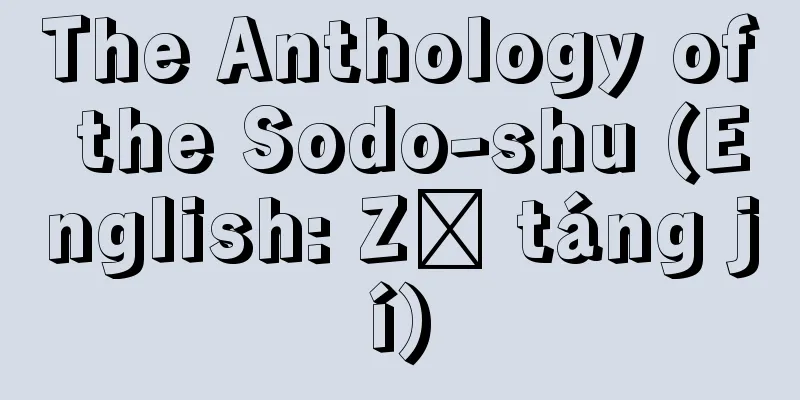Motoori Spring Garden

|
Year of death: 1828.12.13 (11.11.7) Year of birth: 1763.3.17 (1763.3.13) A Japanese scholar of the mid-to-late Edo period. The eldest son of Motoori Norinaga and his wife Katsu. His childhood name was Kenzo, later Kentei. His pen name was Gosuzuya. He was born in Matsuzaka, Ise (Matsusaka City). He received a gifted education from an early age, and at the age of 13, he copied Kamo no Mabuchi's "Nihimanabi," which was already a beautiful piece of handwriting. He began composing poetry at the age of 15, and at the age of 18, he participated in the Reishoin poetry gathering, Matsusaka's largest poetry gathering. From 1786 (Tenmei 6), he wrote the drafts for Norinaga's "Kojiki-den," but at the age of 29, he developed an eye disease, and at the age of 32, he became blind. He studied under Inokawa Motosada and opened an acupuncture practice. After Norinaga's death, his adopted son, Ohira, took over the Motoori family business. Even after he became blind, Shuntei continued to study, and wrote "Shihachikuma" (1808), an immortal work in the history of Japanese linguistics. This book, based on Norinaga's teachings, established the conjugation of verbs and its system, and became the basis of today's grammar system. In Bunka 6 (1809), he organized the Suzuyasha in Ise, and many disciples gathered around him due to his popularity. Shuntei's academic achievement was greatly owed to the dedicated service of his sister Mino and wife Iki, who acted as his ghostwriters, and the material and spiritual support of his patron Tonomura Yasumori. His disciples numbered over 400, including Uematsu Arinobu, Suzuki Satoshi, and Ishizuka Tatsumaro. <References> Adachi Makiichi's Yachimata, volumes 1 and 2, Yamada Kanzo's Motoori Shuntei (Yoichi Iikura) Source: Asahi Japanese Historical Biography: Asahi Shimbun Publications Inc. About Asahi Japanese Historical Biography |
|
没年:文政11.11.7(1828.12.13) 生年:宝暦13.2.3(1763.3.17) 江戸中・後期の国学者。本居宣長,妻かつの長男。幼名健蔵,のち健亭。号後鈴屋。伊勢松坂(松阪市)の生まれ。早くから英才教育を受け,13歳のとき賀茂真淵の『にひまなび』を写したが,当時より見事な筆蹟であった。15歳から作歌をし,18歳で松坂最大の歌会嶺松院歌会に参加した。天明6(1786)年より宣長の『古事記伝』の版下を書いていたが,29歳のとき眼病が発生,32歳で失明するに至った。猪川元貞に学んで鍼医を開業した。宣長の死後,本居家は養子の大平が継いだ。春庭は失明後も学問に励み,国語学史上の不朽の作『詞八衢』(1808)を著した。この書は宣長の所説を受けて,動詞の活用形とその体系を定めたもので,今日の文法体系の基本となった。文化6(1809)年,伊勢に後鈴屋社を組織,その人望を慕って多くの門人が集まった。春庭の学問大成には代筆を務めた妹美濃と妻壱岐の献身的な奉仕とパトロン殿村安守の物心両面にわたる援助が大きかった。門人は植松有信,鈴木朖,石塚竜麿をはじめ400名を超える。<参考文献>足立巻一『やちまた』上下,山田勘蔵『本居春庭』 (飯倉洋一) 出典 朝日日本歴史人物事典:(株)朝日新聞出版朝日日本歴史人物事典について 情報 |
Recommend
Cassius Gold - Cassius Gold
…However, its appearance varies depending on the ...
Hilly area - Kyuryouchi
Mountains are not necessarily defined as being hi...
Unfraiche Kunst - Unfraiche Kunst
...One reason is that from the mid-19th century, ...
Kaba no Kanja - Kaba no Kanja
A title for Kabuki and Joruri. Original title Koto...
Music Library - Ongaku Toshokan
A library that handles music materials such as she...
Mount Uomi
...In addition to Uomi, it is also called Takami,...
Toban cargo book
During the Edo period, seven types of accounts, in...
Scala naturae (English spelling) scalanaturae
...These ideas are sometimes seen as merely a com...
On the Economic Theory of Socialism
…Based on Marxism, he conducted research into mod...
Flag signal - Kiryuushingo
A combination of flags is used to communicate betw...
Goncharova, Nataliya Sergeevna
Born: June 4, 1881 in Tula [Died] October 17, 1962...
Onakatomi Kyo - Onakatomi Kyo
…A Ryobu Shinto book created in the Kamakura peri...
Atmospheric pressure distribution - Atmospheric pressure distribution
This refers to the state of atmospheric pressure ...
Trace - Atome
1. Status as head of a household. Family inheritan...
Gē (English spelling) Ge
…The earth goddess in Greek mythology. Also known...









